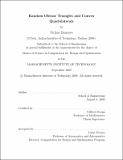Random obtuse triangles and convex quadrilaterals
Author(s)
Banerjee, Nirjhar
DownloadFull printable version (1.317Mb)
Other Contributors
Massachusetts Institute of Technology. Computation for Design and Optimization Program.
Advisor
Gilbert Strang.
Terms of use
Metadata
Show full item recordAbstract
We intend to discuss in detail two well known geometrical probability problems. The first one deals with finding the probability that a random triangle is obtuse in nature. We initially discuss the various ways of choosing a random triangle. The problem is at first analyzed based on random angles (adding to 180 degrees) and random sides (obeying the triangle inequality) which is a direct modification of the Broken Stick Problem. We then study the effect of shape on the probability that when three random points are chosen inside a figure of that shape they will form an obtuse triangle. Literature survey reveals the existence of the analytical formulae only in the cases of square, circle and rectangle. We used Monte Carlo simulation to solve this problem in various shapes. We intend to show by means of simulation that the given probabilatity will reach its minimum value when the random points are taken inside a circle. We then introduce the concept of Random Walk in Triangles and show that the probability that a triangle formed during the process is obtuse is itself random. We also propose the idea of Differential Equation in Triangle Space and study the variation of angles during this dynamic process. We then propose to extend this to the problem of calculating the probability of the quadrilateral formed by four random points is convex. The effects of shape are distinctly different than those obtained in the random triangle problem. The effort of true random numbers and normally generated pseudorandom numbers are also compared for both the problems considered.
Description
Thesis (S.M.)--Massachusetts Institute of Technology, Computation for Design and Optimization Program, 2009. This electronic version was submitted by the student author. The certified thesis is available in the Institute Archives and Special Collections. Cataloged from student submitted PDF version of thesis. Includes bibliographical references (p. 83-85).
Date issued
2009Department
Massachusetts Institute of Technology. Computation for Design and Optimization ProgramPublisher
Massachusetts Institute of Technology
Keywords
Computation for Design and Optimization Program.